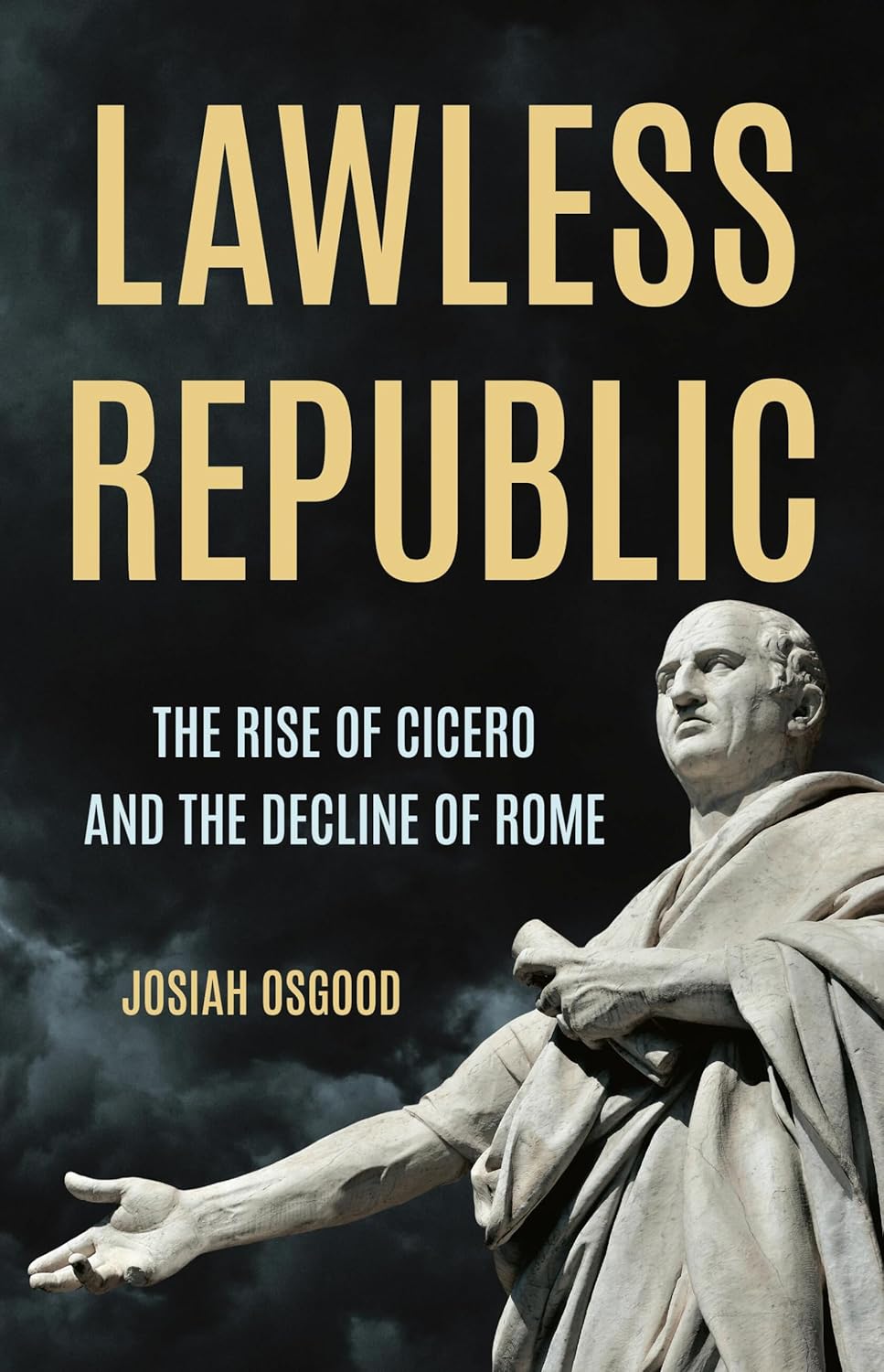Lawless Republic: The Rise of Cicero and the Decline of Rome
- By Josiah Osgood
- Basic Books
- 384 pp.
- Reviewed by Terry Zobeck
- February 3, 2025
What the legendary orator/striver can teach us yet today.

Quite often, biographies and histories have as much to say about the times in which they are written as they do about the periods and people with which they are concerned. This certainly applies to Josiah Osgood’s recounting of the legal and political career of Cicero, one of history’s greatest orators. He presents it as a cautionary tale of how republics can be corrupted and overthrown with the unwitting (or witting) cooperation of those entrusted with preserving and protecting them.
Rather than a life of Cicero, Lawless Republic is a chronicle of some of his most significant legal cases and government positions held within the last decades of Rome. At times, it reads more like a true-crime book or political thriller than an historical treatise.
Cicero began his career as a lawyer at the dawn of Sulla’s dictatorship. One of Sulla’s earliest actions after winning Rome’s first civil war was to reopen the courts. The youthful Cicero was a beneficiary of this act.
Roman trials bear scant resemblance to our modern ones. Both then and now, trials seek to determine the probability of guilt. There are prosecutors and defense attorneys, there is a jury, and witnesses are called. But there the similarity ends. Today, trials examine evidence, there are strict rules of procedure, objections can be made, defendants have constitutionally protected rights, and juries comprise a defendant’s peers.
In Cicero’s day, there were no police or forensic experts or evidence gathering. Evidence, as we know it, was essentially nonexistent except for eyewitness testimony, which was easily impeached or disregarded. If slaves were called as witnesses, they first had to be tortured for their testimony to be judged credible. More important in determining the probability of guilt were the motive, opportunity, and character of the defendant and the witnesses, elements of little consequence in today’s courtrooms. Jurors, who were senators, often were bribed or intimidated by violence.
An important feature of the defense in a Roman trial was invention; the description of the crime with which defendants were charged that demonstrated how they could not possibly be guilty of it. The defense was permitted to be as creative as possible, including simply making up facts. Slander of the vilest sort was permissible to discredit the character of the prosecutors, accuser, jurors, and witnesses. Cicero was an expert at invention.
There were courts for various categories of crime, including murder (stabbing or poison), bribery, violence, and perhaps most serious, extortion. These charges were most often brought against the elite classes and were a mechanism to attempt to guarantee that Rome’s citizens were treated justly. In the last decades of the Republic, though, they were an abject failure, and Cicero helped contribute to this failure through his manipulation of the courts and lust for political power.
Osgood examines in some detail seven of Cicero’s most celebrated or consequential trials, five as defense counsel and two as prosecutor. One of Cicero’s earliest cases was the trial of Sextus Roscius Jr. for the murder of his father. This trial featured one of the earliest uses of the legal stratagem of cui bono, or who benefits. Cicero was successful in demonstrating that there were others who benefited from Sextus senior’s death besides his son.
Cicero used his victories in court to launch his political career. He was elected to several positions, progressing ultimately to consul, the most senior elected official in Rome. Throughout his career, he also was a member of the Senate.
Cicero’s most consequential — both personally and professionally — political action was his opposition to Catiline, a fellow senator and leader of a populous movement that tried to overthrow the government. In the final decades of the Republic, there was tremendous wealth inequality, the rights of the general citizenry were circumscribed, and living conditions were poor. Cicero did little to address these issues as consul or senator.
When Catiline took up arms against Rome, Cicero — who identified with the upper classes and usually sided with them — was at the forefront of opposing him. He successfully argued for Catiline and his four leading accomplices to be executed without trial immediately following their capture. While initially a popular outcome, the executions quickly became offensive to Romans, whose belief in the right to a fair trial was paramount to their concept of citizenship. In the ensuing years, this decision came to move public opinion against Cicero and contributed to his downfall.
Cicero’s worst decision, however, was to side with Pompey and his faction against Julius Caesar. Cicero was not involved in the subsequent plot to assassinate Caesar, but he aided in the defense of the conspirators, arguing that Roman history supported the concept of eliminating tyrants. His defense of Brutus, Cassius, and the others pitted him against Mark Antony, who succeeded Caesar. Antony issued a proscription against Cicero, who eventually was captured and summarily executed.
Despite his humiliating defeat and death, Cicero’s reputation as one of Rome’s finest lawyers and orators has been preserved. His speeches continue to be read and cited as the pinnacle of logic and persuasion. He has inspired novels, including Steven Saylor’s superb 13-book Roma Sub Rosa series about Gordianus the Finder, a private investigator whose patron in several of the books is Cicero. British author Robert Harris, too, wrote an excellent trilogy based upon Cicero’s career.
Rome’s politicians in the waning days of the Republic unleashed the basest demagoguery to demonize their opponents and justify tyranny, and Cicero was a leading proponent and practitioner of this strategy. While the Roman Empire continued for several centuries beyond his death, the Republic came to an end shortly after it. Josiah Osgood has written in Lawless Republic a compelling and fascinating account of Cicero’s role in the Republic’s collapse and its lessons for our times.
Terry Zobeck is a retired federal substance-use researcher and policy analyst. He is the author of A Trawl among the Shelves: Lawrence Block Bibliography, 1958-2020.

.png)